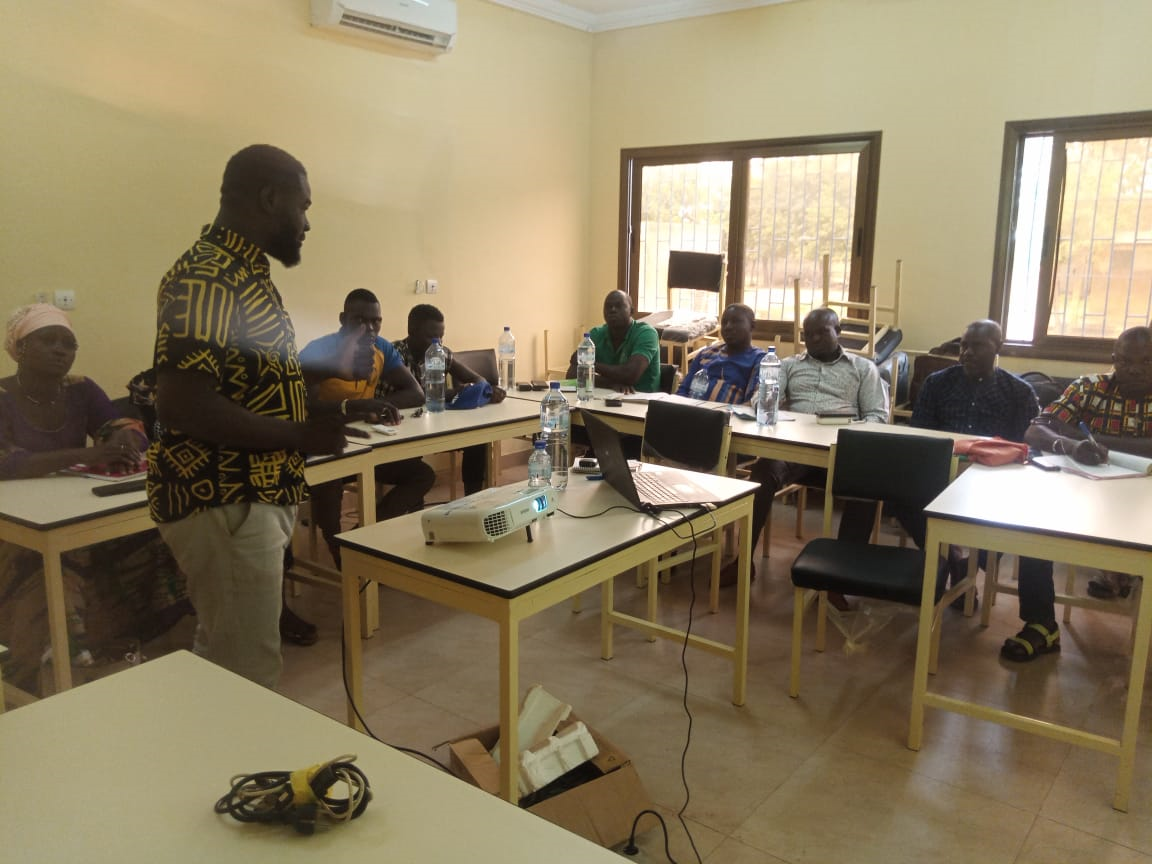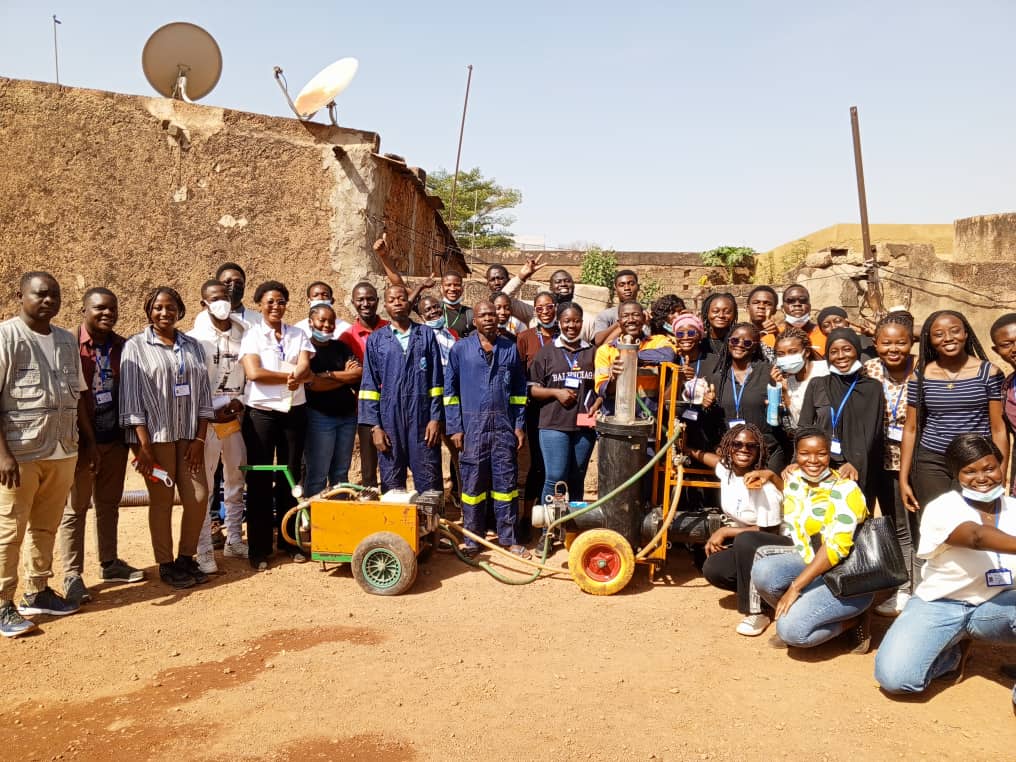July 2025 Advocacy Pays Off: Official Recognition of Manual Emptiers Unlocks New Opportunities Alidou Bande and Sterenn Philippe
July 2025 Advocacy Pays Off: Official Recognition of Manual Emptiers Unlocks New Opportunities Alidou Bande and Sterenn Philippe
Following years of advocacy by the Association of Manual Emptiers of Burkina Faso (ABASE), the government officially recognised manual emptying as a profession in 2023, opening the door to municipal licensing and to Africa’s first formal vocational training program for manual emptiers, set to launch at the end of this year.
(voir la version française ici)
The advocacy
ABASE knows advocacy takes time, but they also know that persistence pays off.
For years, one of the association’s priorities was getting manual emptiers officially recognised as professionals by the government. Without this recognition, workers were left without access to the basics, such as social protection, financial services, and health and safety measures. The risks were high, and the support was low.
Alidou Bande, the president of ABASE, recalls those early days. Founded in 2012, the association wasn’t well known to government authorities. “We had to start from scratch” he says. “We sent out letters to introduce ourselves.” Authorities responded to his letters with an invitation to a meeting, an opportunity Alidou seized. He presented ABASE’s mission and objectives with the same professionalism and passion he brings to every conversation. From then on, ABASE took a proactive stance: they accepted every invitation, attended every meeting, and spoke up at every opportunity with a clear message: “Manual emptiers are not your enemies, we are here to prevent pollution and protect human health.”
They backed up their message with real stories—case studies, photos, and videos that showcased their work and impact. They also partnered with 2iE, one of Burkina Faso’s most respected universities. That partnership not only brought credibility but also opened doors to deeper collaboration with public institutions.
As ABASE worked to build its reputation and strengthen government relationships, a political decision soon challenged the association, revealing just how far there was still to go.
2019: Manual emptying is illegal
In 2019, Alidou learnt that his profession had become illegal. The government had passed a new decree (decree n°2019-0320). It was both surprising and, in some ways, not. At the time, manual emptiers carried a heavy stigma. The public image of the profession was poor, and few in power understood the critical role they played in sanitation. Alidou went straight to the Chamber of Trades to demand answers. “You recognise masons, carpenters, plumbers... but not manual emptiers?” he asked, but no concrete answer was provided.
Although this was a new, disappointing reality, ABASE didn’t back down. A few years later, in 2021-2022, that same decree came up for revision as part of the government’s renewed focus on sanitation. It officially legalised certain types of latrines—sanplats, ecosan, VIPs—as part of a national effort to move households up the sanitation ladder, from traditional to improved toilets. For ABASE, this was a game-changer. Not all these types of latrines could be emptied by mechanical emptiers alone. Manual emptiers were not just relevant—they were essential.
With the timely support from the Initiative for Sanitation Workers (ISW) starting in 2022 which provided a powerful boost to their advocacy efforts, Alidou set out to meet government officials—specifically the Director of Sanitation at the Ministry. He laid out a clear case: if the government truly wants to improve sanitation for all, it needs to recognise the reality on the ground. Mechanical emptiers can’t reach every latrine. Sometimes the pit is too deep, or the sludge is too thick, or the truck simply can’t get through. In fact, Alidou explained, manual and mechanical emptiers often work hand in hand. When a vacuum truck can’t start or finish the job, it’s a manual emptier who gets the call. Their roles are different, but complementary.
It was a powerful argument. Slowly, perceptions began to shift.

2023: Manual emptying is legal
One day in 2023, Alidou was once again at the Department of Sanitation, doing what he had done for years: advocating. He was mid-sentence, passionately explaining why manual emptying needed to be legalised, when a government official cut him off. “Didn’t you hear?” they said, “Manual emptying has been authorised.” Shortly after the government official shared Decree No. 2023-1248 with Alidou, concerning the regulation of on-site sanitation for wastewater and excreta, signed August 17, 2023.
|
Article 36 [Translation from French] The evacuation of wastewater and excreta through manual emptying shall be carried out by operators holding a license to practice, issued by local municipalities. The conditions and modalities for practicing manual emptying shall be defined by a joint ministerial order from the Ministers responsible for the environment and sanitation, local governments, and health. |
Articles 36 and 37 were especially significant for ABASE. They didn’t just recognise manual emptying as a legitimate profession—they required that local authorities issue licenses to workers and mandated the creation of faecal sludge treatment plants in every municipality in the country. For Alidou and the ABASE team, it was a moment of validation. But the work was far from over.
For example, Alidou explains that the licensing system—which would allow workers to operate legally and more safely—is still being developed. One major sticking point remains: the current proposal requires manual emptiers to obtain a separate license for each municipality, a significant burden for emptiers that work across multiple areas. ABASE has participated in four technical workshops with the Ouagadougou municipality to help shape these proposals and continues to advocate for a more streamlined, nationally recognised license that better reflects the mobile and cross-municipal nature of the work.
The impact on manual emptiers
The ripple effects of ABASE’s advocacy, and the recognition of manual emptiers, are already being felt—both within the association and on the ground where manual emptiers work every day.
For the emptiers themselves, official recognition has meant dignity. The stigma surrounding their work is beginning to lift. They’re no longer forced to operate in the shadows. “Before, if you had to empty pits at a restaurant, you had to do it late at night, when the customers were gone,” Alidou explains. “But that meant more risk. At night, you’re more likely to be stopped by police. Now, we can work whenever it is appropriate, and without fear.”
But the impact goes beyond social acceptance. Recognition has opened doors to real collaboration with government bodies. One major outcome has been ABASE’s participation in a feasibility study on faecal sludge treatment plants—critical infrastructure that has long been absent from Burkina Faso’s sanitation systems. But perhaps most notably, ABASE has already been contracted by the Department of Sanitation to manage emptying operations in camps for Internally Displaced Persons. Alidou explains the scale of the work, “In just 10 days, the association carried out 185 pit emptying operations in a single IDP camp, with 325 more scheduled in that same location—and another 240 set for a different city.”
For a profession once considered illegal, the transformation is remarkable.
What’s next: The first vocational training program for manual emptiers in Africa
For Alidou Bande, ABASE’s president, the next goal has always been clear: formal training for manual emptiers. It's a vision he’s held onto for years—one rooted in the belief that with the right skills and support, manual emptiers can operate safely, professionally, and proudly.
That vision is now taking shape. This year, ABASE is launching a groundbreaking partnership with CEMEAU, the training institute of ONEA (Burkina Faso’s National Office of Water and Sanitation). By combining CEMEAU’s expertise in vocational education with ABASE’s deep, hands-on knowledge of manual emptying, the two organisations are co-creating a structured, high-quality training program. This programme will blend theoretical and practical modules, and—most importantly—will be officially recognised by the government, offering vocational certificates to participants.
The process to develop the training programme begins with a six-month consultative phase, during which ABASE, CEMEAU, key government authorities, and other stakeholders, will develop a reference framework for the programme: the curriculum. Once the framework is in place, ABASE will work with CEMEAU to adapt its existing training materials to meet these new standards, paving the way for a fully accredited programme. The pilot training will roll out in three cohorts, each with around 40–50 participants, and span 14 days each. The curriculum is designed to provide technical know-how, like best practices in health, safety, and environmental standards, but it will also empower participants with skills in business creation, legal compliance, and financial management—tools to help them build sustainable livelihoods.
For ABASE, this is more than a training programme—it’s transformation.

How to support?
ABASE has made strong progress in securing funding for the training program and is now seeking additional partners to help scale this initiative.
You can reach out to Alidou at alidouband@yahoo.fr.
------------------------------------------------------------------------------------------------------------------
